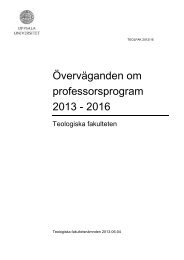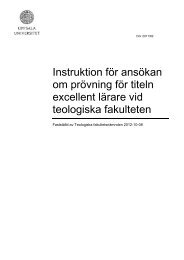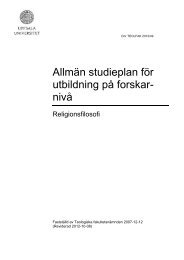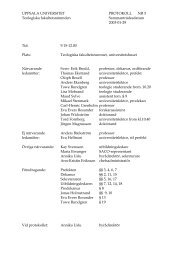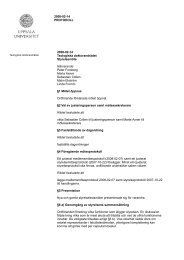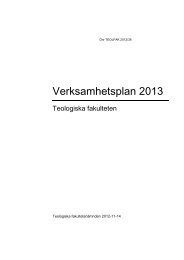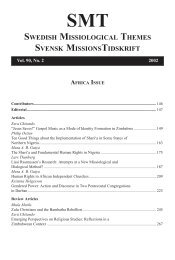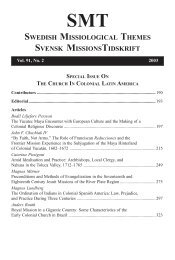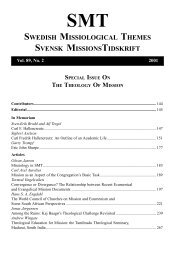SWEDISH MISSIOLOGICAL THEMES SVENSK MISSIONSTIDSKRIFT
SWEDISH MISSIOLOGICAL THEMES SVENSK MISSIONSTIDSKRIFT
SWEDISH MISSIOLOGICAL THEMES SVENSK MISSIONSTIDSKRIFT
Create successful ePaper yourself
Turn your PDF publications into a flip-book with our unique Google optimized e-Paper software.
506 Aasulv Lande<br />
in the so-called Christian world today – not at least in the post-Soviet<br />
countries – and in the so-called “Third World” that is also called “the Two-<br />
Thirds-World.”<br />
For obvious reasons – among them the closeness in time to our days – it is<br />
especially common to refer to the worldwide evangelisation that took place<br />
during the colonial era mission. Part of that is Catholic mission following<br />
Spanish and Portuguese colonial enterprises. Part of it is Protestant missions<br />
after the eighteenth century Enlightenment and the emerging Protestant<br />
colonial powers in northern Europe (England, Germany, Holland, and<br />
Scandinavia). Often this process has defined the understanding of mission.<br />
In other words it is not the original meaning of mission as sending and its<br />
content (the Gospel) that defines mission but a modern, contextual historical<br />
process, which we in a certain sense have left behind us. To a certain extent,<br />
but only to a certain extent, this process coincides with what the Christian<br />
sources calls mission.<br />
Universal mission concepts and Buddhism and Islam<br />
Here it is interesting to note two other world religions “mission” – the<br />
Islamic dawa and the Buddhist dhammaduta. What are those two words<br />
about? The Arabic word dawa means call, i.e. the call to Gods way and<br />
thus in a sense it has a reverse meaning compared to mission. 2 This is<br />
because missio is to go out, but dawa is to summon, to call in. Interestingly<br />
enough, it practically means the same thing in the historical context.<br />
Christian mission has also meant to summon, to call in to God. And in<br />
Islam, God sends out the prophets. But there is an etymological difference<br />
between the two concepts of mission. And what about Buddhism? Also<br />
dhammaduta (a Pali word for sending) conveys the same content as is carried<br />
by the Christian missionary: “Now go out for the well being and happiness<br />
of the many, go out in compassion with the world, for the good of Gods and<br />
humans, to toy and happiness”. 3 Buddhism is by all means the most<br />
homocentric of these three religions – but it also has a sending perspective,<br />
a universal idea of mission.<br />
2 An interesting Swedish study on dawa is Janson 2002, cf. also his thesis Janson 2003.<br />
3 Cf. an Article in SMT by the Buddhist Gunnar Gällmo on dhammaduta, Gällmo 1982.



